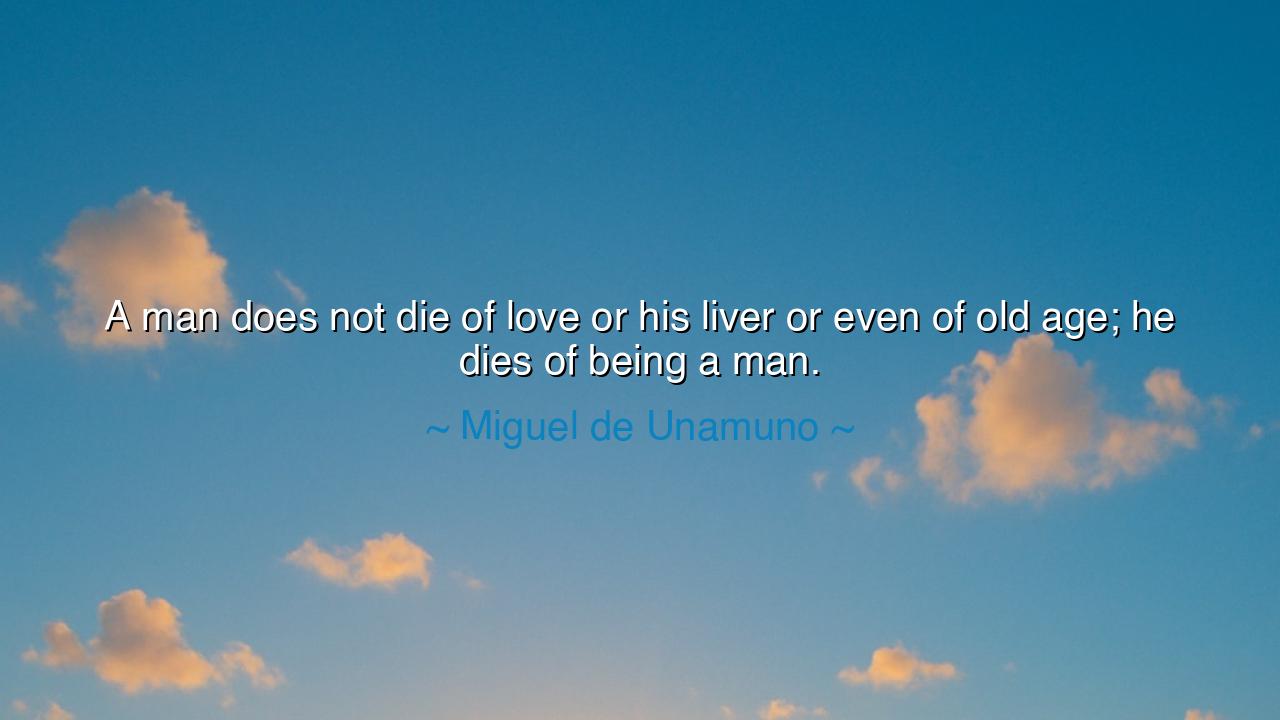
A man does not die of love or his liver or even of old age; he






In the vast and ancient expanse of human existence, where every soul is born, strives, and eventually fades, there lies a profound truth spoken by Miguel de Unamuno: "A man does not die of love or his liver or even of old age; he dies of being a man." These words, full of depth and wisdom, speak to the very essence of what it means to be human. Unamuno does not suggest that the body or circumstances alone determine our end, but that it is the condition of the human spirit, the trials of the soul, that ultimately lead us to our fate. To live as a man is to live with the burden of contradictions, of dreams unfulfilled, of the inevitable struggle between flesh and spirit.
From the earliest days of human civilization, the wise have understood the dual nature of existence. The Greek philosophers, in their search for wisdom, often spoke of the inner conflict within man: the tension between reason and passion, between the soul and the body. Socrates spoke of the soul’s journey toward enlightenment, knowing that while the body is frail and finite, it is the mind and spirit that give life its true meaning. Yet, as Unamuno reminds us, the very act of living—of being a human—is what causes suffering and, ultimately, death. It is not the natural forces of life, but the inherent contradictions of our nature that wear us down, make us weary, and lead us to the end.
Think of the story of Hercules, the mighty hero whose strength knew no equal. He completed his labors, each one more difficult than the last, yet in the end, it was not his physical strength that led to his demise, but the weight of his humanity. The internal struggles he faced, the endless striving to live up to the impossible ideals of heroism and glory, ultimately wore him down. His tragic flaw was not his physical body, but the very nature of being a hero—a nature that demanded sacrifice, suffering, and unrelenting pursuit. In this way, Hercules exemplifies Unamuno’s words: the human condition, with all its trials and contradictions, is what ultimately brings him to his end.
Unamuno’s insight is not merely a reflection on physical death, but a deeper meditation on the psychological and spiritual toll of being human. Each of us is born with the same inherent conflict—the desire for meaning in a world full of uncertainty, the yearning for purpose amidst the fleeting nature of life. As we grow, we face the struggles of love, of loss, of ambition, of regret. These experiences are part of the great human drama. Old age is not the cause of death, but the culmination of a life lived with ambivalence and unfulfilled aspirations. Unamuno’s words point to the fact that we do not die because of the circumstances we encounter, but because we are caught in the relentless tides of being human, in a world that demands but does not always give in return.
In the life of Leonardo da Vinci, we see this truth played out. Da Vinci was not simply a man of the Renaissance—he was a man burdened with an insatiable quest for knowledge, a constant striving to understand the mysteries of the universe. Yet, despite his brilliance, despite the countless inventions, paintings, and discoveries, he was tormented by a sense of unfinished business. The very drive that made him great—the unyielding pursuit of perfection—also led to his inner turmoil. His life, like that of Hercules, was marked by a constant tension between the physical and the spiritual, and in the end, it was not his talent but his humanity that shaped his fate. He, too, died not of the body’s weaknesses, but of the very nature of being a man—a soul struggling with the limits of existence.
Thus, we learn that the struggle of life is not in the external battles we face, but in the inner war we wage against the very nature of our being. Unamuno reminds us that to be human is to be in constant conflict—to long for meaning, to face the tension between our desires and our limitations, and to struggle against the forces that seek to pull us toward death. It is the very nature of humanity—the questions we ask, the struggles we endure, the hopes and regrets—that lead us to our end. Life is not merely about surviving the external world, but about navigating the complexities of the inner self.
The lesson here is simple: live with awareness of the dualities within you. Do not simply endure the world around you, but engage with the internal journey of being human. Recognize that death does not come solely from external forces—it comes from the human condition itself. Embrace your contradictions, your imperfections, and understand that the true essence of life lies not in avoiding death or struggle, but in learning to live fully with both. Practical action calls us to find peace not in avoiding life’s burdens, but in accepting them, growing through them, and ultimately finding meaning in the midst of life’s inevitable struggles.






AAdministratorAdministrator
Welcome, honored guests. Please leave a comment, we will respond soon